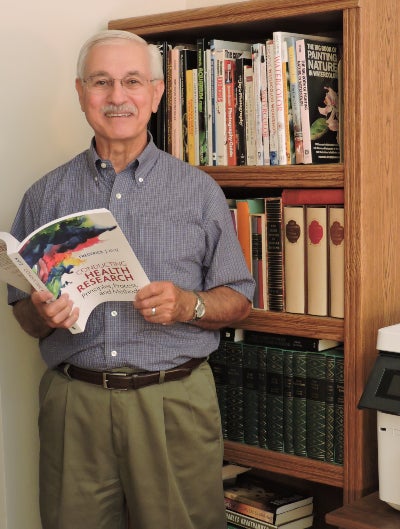Emeritus Faculty Continues to Have Impact
About Dr. Fred Kviz Heading link

Though retired for five years, Dr. Fred Kviz’s impact continues resonating at the UIC School of Public Health (SPH). His influence shines in courses he developed, colleagues and alumni he mentored, and, most recently, an endowed gift designed to support innovative PhD dissertation research in Community Health Sciences (CHS).
After earning a PhD in sociology from UIC in 1975 and then joining SPH’s faculty ranks in 1979, Kviz has spent the last 40 years contributing to the health, advancement and prominent reputation of SPH as an award-winning teacher, prolific researcher and caring mentor. “I wanted to have the full complement of what it meant to be on faculty and in service to the university,” the Chicago native says of his active SPH career, which began in the Epidemiology and Biostatistics Division before a 1986 move to CHS.
Kviz taught courses and workshops primarily focused on research methods such as research design, measurement, survey research methods and questionnaire design, developing some courses from scratch while substantially revising others. He also co-founded and served as co-director of the UIC Interdepartmental Graduate Concentration in Survey Research Methodology. “I had a rather simple goal: to arm students with knowledge and skills that are relevant and applicable,” he says.
Kviz’s research, meanwhile, centered on the influence of psychosocial and sociocultural factors on health promotion and illness prevention attitudes and behavior as well as health disparities. He authored 55 peer-reviewed publications, touching on a diverse array of topics ranging from smoking cessation and substance abuse to childhood immunization and the use of community health services, often leveraging his hometown’s dynamic, diverse population to conduct his original research. “You can take virtually any aspect of life and bring it into public health research,” says Kviz, who also served as a consultant to various public and private-health related agencies.
Finally, as a mentor to SPH colleagues and graduate students, Kviz willingly shared his expertise in survey research methods, research design and measurement to fuel investigative work, while he also encouraged graduate students to pursue intriguing questions with a resilient, persevering attitude.
Dr. Meme Wang-Schweig (PhD ‘12) called Dr. Kviz “a motivating force” as she pursued her PhD, an endeavor that brought its share of challenges, including a shift from studying HIV among minority women to investigating underage drinking among immigrant families.
“During the PhD process, it’s easy to feel isolated, but Fred was always genuinely interested in my progress,” says Wang-Schweig, now a research assistant professor in CHS. “I honestly don’t know if I would have finished my PhD without his guidance and care,” she says.
SPH leadership appointed Kviz professor emeritus in CHS upon his retirement in 2014, and he has remained committed to sharing his knowledge, highlighted by the recent completion of a research methods textbook. Conducting Health Research: Principles, Process, and Methods was published in March by SAGE Publications. “It took four years because I wanted to be as thorough and exacting as possible,” Kviz says.
Over the last five years, Kviz has also reflected on one of the most stifling issues he encountered as a PhD advisor and member of SPH’s committee on academic progress. Too often, he met students forced to make hard choices about the research they could feasibly conduct, a reality that often meant a project would struggle to reach its potential. “I saw students trying to support their own research, cobbling together gifts and grants that would only get them so far,” Kviz says.
Looking to remedy that situation, Kviz and his wife, Linda, endowed the Dr. Frederick J. Kviz PhD Dissertation Research Support Scholarship, designed to support CHS PhD students conducting cutting-edge research.
Associate dean of academic affairs Dr. Susan Altfeld (PhD ‘95) says Kviz’s gift characterizes his thoughtful, collaborative and nurturing spirit. “Funding like this enables students to do more,” Altfeld says. “It’s a wonderful gift that can motivate a young researcher and reinforce the promise of their ideas.”
For his part, Kviz hopes the awards help emerging researchers complete their projects with a more confident, enterprising mindset. “This isn’t as much as I’d like to see available, but I certainly believe it can help these budding researchers,” Kviz says. “There will never be enough to cover all the good ideas we encounter, but the more we can cover, the better.”